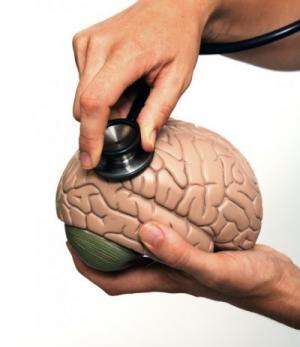Switching brain development on and off

(Medical Xpress)—The possibility of nerve cell regeneration is a step closer after neuroscientists identified the genetic signals that play a crucial role in normal development - driving stem cells to produce neurons that are correctly positioned and connected neurons within the brain.
Published in Cerebral Cortex, a study led by Dr Julian Heng of the Australian Regenerative Medicine Institute (ARMI) at Monash University, has identified a transcription factor, RP58, which is an important "off switch" for the process of nerve cell formation.
"Known as RP58, this gene switches off Rnd2 expression to control the proper positioning of neurons within the fetal brain - a crucial process," Dr Heng said.
Absence of RP58 has been linked to a rare brain developmental disorder known as Terminal 1q deletion syndrome, where patients suffer reduced brain growth, experience epileptic seizures and are intellectually disabled.
Dr Heng's work, on pre-clinical models, builds on previous research in which another transcription factor, Neurog2, operated as the "on-switch" for the crucial process of early brain development whereby stem cells become neurons.
Neurog2 switches on the expression of another gene, Rnd2, to control how new nerve cells of the developing brain find their appropriate location and go on to establish their proper connections. However, too much Rnd2 can impair the path-finding of new neurons, and so the researchers theorised that an "off-switch" controlled the process.
Dr Heng said that the discovery of RP58 was the proof needed to demonstrate that genes such as Rnd2 must be switched on, and then off in order for brain cells to assemble properly.
"Together with a collaborative study we published with our colleagues earlier in the year, this research demonstrates that loss of RP58 impairs the development of new nerve cells in the embryonic mouse brain, including their path-finding," Dr Heng said.
"Since the early steps of nerve cell production during brain development are comparable between mice and humans, we believe that RP58 carries out similar functions in the foetal human brain as well. This strengthens the notion that disruptions to this gene can cause brain developmental disease."
Recently, a study led by researchers at Stanford University in the United States provided evidence showing that RP58 (also known as ZFP238) is crucial for the maturation of new human nerve cells.
Dr Heng believes his discoveries could be used in the context of regenerative medicine.
"Ultimately, the goal of our research is to understand the fundamental properties which control the production and maturation of new nerve cells in the brain. Understanding the function of switches like RP58 is crucial to this process," Dr Heng said.
"In the future, we will use this knowledge to develop novel cell-based therapies to treat neurodegenerative disorders and brain injury."
More information: Julian Ik-Tsen Heng, Zhengdong Qu, Chiaki Ohtaka-Maruyama, Haruo Okado, Masataka Kasai, Diogo Castro, François Guillemot, and Seong-Seng Tan. "The Zinc Finger Transcription Factor RP58 Negatively Regulates Rnd2 for the Control of Neuronal Migration During Cerebral Cortical Development." Cereb. Cortex first published online October 1, 2013 DOI: 10.1093/cercor/bht277















